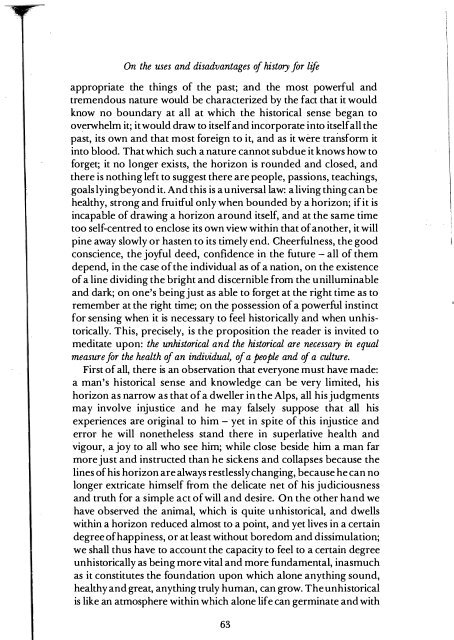Friedrich_Nietzsche - Untimely_Meditations_(Cambridge_Texts_in_the_History_of_Philosophy__1997)
Friedrich_Nietzsche - Untimely_Meditations_(Cambridge_Texts_in_the_History_of_Philosophy__1997)
Friedrich_Nietzsche - Untimely_Meditations_(Cambridge_Texts_in_the_History_of_Philosophy__1997)
Create successful ePaper yourself
Turn your PDF publications into a flip-book with our unique Google optimized e-Paper software.
On <strong>the</strong> uses and disadvantages <strong>of</strong> history Jor lifeappropriate <strong>the</strong> th<strong>in</strong>gs <strong>of</strong> <strong>the</strong> past; and <strong>the</strong> most powerful andtremendous nature would be characterized by <strong>the</strong> fact that it wouldknow no boundary at all at which <strong>the</strong> historical sense began tooverwhelm it; it would draw to itself and <strong>in</strong>corporate <strong>in</strong>to itself all <strong>the</strong>past, its own and that most foreign to it, and as it were transform it<strong>in</strong>to blood. That which such a nature cannot subdue it knows how t<strong>of</strong>orget; it no longer exists, <strong>the</strong> horizon is rounded and closed, and<strong>the</strong>re is noth<strong>in</strong>g left to suggest <strong>the</strong>re are people, passions, teach<strong>in</strong>gs,goals ly<strong>in</strong>g beyond it. And this is a universal law: a liv<strong>in</strong>g th<strong>in</strong>g can behealthy, strong and fru itful only when bounded by a horizon; if it is<strong>in</strong>capable <strong>of</strong> draw<strong>in</strong>g a horizon around itself, and at <strong>the</strong> same timetoo self-centred to enclose its own view with<strong>in</strong> that <strong>of</strong> ano<strong>the</strong>r, it willp<strong>in</strong>e away slowly or hasten to its timely end. Cheerfulness, <strong>the</strong> goodconscience, <strong>the</strong> joyful deed, confidence <strong>in</strong> <strong>the</strong> fu ture - all <strong>of</strong> <strong>the</strong>mdepend, <strong>in</strong> <strong>the</strong> case <strong>of</strong> <strong>the</strong> <strong>in</strong>dividual as <strong>of</strong> a nation, on <strong>the</strong> existence<strong>of</strong> a l<strong>in</strong>e divid<strong>in</strong>g <strong>the</strong> bright and discernible from <strong>the</strong> unillum<strong>in</strong>ableand dark; on one's be<strong>in</strong>g just as able to fo rget at <strong>the</strong> right time as toremember at <strong>the</strong> right time; on <strong>the</strong> possession <strong>of</strong> a powerful <strong>in</strong>st<strong>in</strong>ctfor sens<strong>in</strong>g when it is necessary to feel historically and when unhistorically.This, precisely, is <strong>the</strong> proposition <strong>the</strong> reader is <strong>in</strong>vited tomeditate upon: <strong>the</strong> unhistorical and <strong>the</strong> historical are necessary <strong>in</strong> equalmeasure Jor <strong>the</strong> health <strong>of</strong> an <strong>in</strong>dividual, <strong>of</strong> a people and oJ a culture.First <strong>of</strong> all, <strong>the</strong>re is an observation that everyone must have made:a man's historical sense and knowledge can be very limited, hishorizon as narrow as that <strong>of</strong> a dweller <strong>in</strong> <strong>the</strong> Alps, all his judgmentsmay <strong>in</strong>volve <strong>in</strong>justice and he may falsely suppose that all hisexperiences are orig<strong>in</strong>al to him - yet <strong>in</strong> spite <strong>of</strong> this <strong>in</strong>justice anderror he will none<strong>the</strong>less stand <strong>the</strong>re <strong>in</strong> superlative health andvigour, a joy to all who see him; while close beside him a man farmore just and <strong>in</strong>structed than he sickens and collapses because <strong>the</strong>l<strong>in</strong>es <strong>of</strong> his horizon are always restlessly chang<strong>in</strong>g, because he can nolonger extricate himself from <strong>the</strong> delicate net <strong>of</strong> his judiciousnessand truth for a simple act <strong>of</strong> will and desire. On <strong>the</strong> o<strong>the</strong>r hand wehave observed <strong>the</strong> animal, which is quite unhistorical, and dwellswith<strong>in</strong> a horizon reduced almost to a po<strong>in</strong>t, and yet lives <strong>in</strong> a certa<strong>in</strong>degree <strong>of</strong> happ<strong>in</strong>ess, or at least without boredom and dissimulation;we shall thus have to account <strong>the</strong> capacity to feel to a certa<strong>in</strong> degreeunhistorically as be<strong>in</strong>g more vital and more fu ndamental, <strong>in</strong>asmuchas it constitutes <strong>the</strong> foundation upon which alone anyth<strong>in</strong>g sound,healthy and great, anyth<strong>in</strong>g truly human, can grow. The unhistoricalis like an atmosphere with<strong>in</strong> which alone life can germ<strong>in</strong>ate and with63


